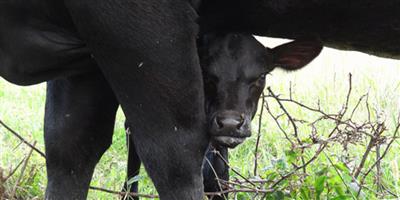BROOKINGS, S.D. – This calving season, SDSU Extension Cow/Calf Field Specialist, Taylor Grussing encourages cattle producers to consider pre-calving vaccinations.
“Pre-calving vaccination of pregnant cows can aid in controlling calf scours,” Grussing said.
She explained that attention to these areas is warranted as is critical to both performance of cows and health of newborn calves.
Pre-Calving Vaccinations
Adequate colostrum ingestion is so critical for calves because they are born without the protective immunity of antibodies to common environmental disease organisms. The “first milk,” or colostrum, is what transfers protective antibodies to the calf.
“Producers can improve the quality of colostrum by providing strategic vaccination to the dam while also providing adequate nutrition throughout the winter,” Grussing said.
The main goal of giving pre-calving vaccinations to pregnant females, Grussing explained, is to maximize protection against the calf scours complex.
“In order for this type of vaccination to be effective in transmitting protection to the newborn calf, it must be delivered to the pregnant female at the correct dose, and within an appropriate window of time,” Grussing said.
How pre-calving vaccinations work
Pre-calving vaccinations stimulate production of antibodies in the mother's body, which are then directed towards the mammary gland when she begins producing colostrum.
Increased levels of antibodies targeted to scours organisms in the mother's blood while she produces colostrum, results in more of these specific antibodies in it. These antibodies are then passively delivered to the newborn calf through its first drink of colostrum, providing a first line of immunity within hours after birth.
In order to ensure the most effective transfer of high levels of antibodies, Grussing explained that cattle producers must administer the vaccine at the proper times.
Pregnant females begin to form colostrum by pulling antibodies from the blood and storing them in the mammary tissue three to five weeks before calving.
“This process continues until birth,” Grussing said. “Therefore, performing booster vaccinations six to seven weeks prior to the expected calving date may not be effective in aiding high quality colostrum production or in preventing calf scours.”
Depending on the age of the cow and type of product used, Grussing added that there are different requirements which need to be followed. For example, heifers require an initial vaccination followed by a booster at least three weeks later (follow label recommendations), whereas cows that have been vaccinated in previous years only require an annual booster.
Grussing encourages cattle producers to always consult with their herd veterinarian for assistance in developing a pre-calving vaccination program specific to their cow herd needs.
For additional examples, visit the iGrow Beef community.
Scours Management Factors
Scours is a complex and costly disease issue and should be confronted from many angles in order to limit outbreaks, explained Joe Darrington, SDSU Extension Livestock Environment Associate.
“Maternal vaccination can significantly increase the level of antibodies present in the colostrum, but in order to be effective calves must ingest an adequate amount of colostrum within the first 12 – 24 hours of life,” Darrington said.
He added that unsanitary and contaminated conditions may overwhelm the maternal antibodies calves receive.
“By keeping calving areas clean and by purposefully limiting cross contamination between age groups of calves you can ensure that this year's calf crop will have the best chance to stay healthy,” Darrington said.
He encourages cattle producers interested in learning more to check out the Sandhill's Calving System, which is a management style that can help limit scours. An article describing this system can be found at the iGrow Beef community.
If cattle producers have questions or want more information, they can contact an SDSU Extension Cow/Calf Field Specialist. Complete contact listing can be found at the iGrow Our Experts page.
Source: iGrow, SDSU Extension





